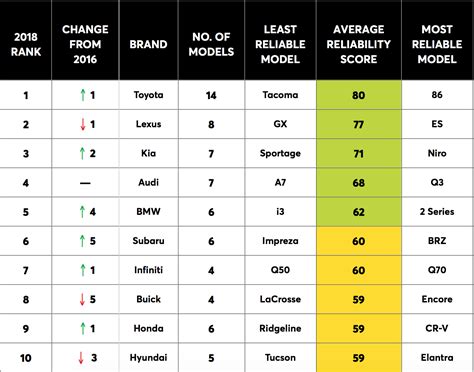
Three of Japan’s automotive powerhouses, long celebrated for their dependability, have seen their reliability rankings slip in the latest 2025 reliability reports, raising questions about shifting manufacturing standards and increasing technological complexity in new vehicles. Toyota, Honda, and Nissan, frequently lauded for their build quality and longevity, all experienced a decline in this year’s assessments, signaling a potential shift in the automotive landscape.
The annual reliability surveys, conducted by independent consumer advocacy groups and industry analysis firms, assess vehicle dependability based on owner-reported issues across various categories, ranging from engine and transmission problems to electrical glitches and infotainment system malfunctions. These reports serve as a crucial guide for consumers when making purchasing decisions and heavily influence brand reputation. While the specific details of each report vary depending on the methodology employed, the overall trend indicates a concerning dip in reliability for these Japanese automakers.
Toyota, often considered the gold standard in automotive reliability, experienced a moderate decline, attributed primarily to issues with its newer, technologically advanced models. Honda’s drop was more pronounced, with reviewers citing problems related to its infotainment systems and advanced driver-assistance features. Nissan, facing ongoing challenges in its product lineup, also saw its reliability scores decline, reflecting broader concerns about the brand’s overall quality control.
These reliability setbacks come at a critical time for the automotive industry, which is undergoing a rapid transformation driven by electrification, connectivity, and autonomous driving technologies. The increased complexity of modern vehicles presents new challenges for automakers, requiring them to maintain high standards of quality and reliability while simultaneously innovating at a rapid pace.
According to industry analysts, the decline in reliability among these Japanese automakers could be attributed to several factors, including increased pressure to reduce costs, the integration of complex new technologies, and supply chain disruptions that have affected the availability of high-quality components.
“The automotive industry is facing unprecedented challenges,” said David Johnson, a senior analyst at Consumer Reports. “The pressure to innovate and incorporate new technologies is immense, but automakers must not compromise on quality and reliability. Consumers expect their vehicles to be dependable, and brands that fail to meet those expectations will ultimately suffer.”
The implications of these reliability setbacks are significant for the Japanese automakers, who have built their reputations on a foundation of quality and dependability. A decline in reliability could erode consumer trust, damage brand reputation, and ultimately impact sales.
Toyota’s Reliability Decline
Toyota, consistently ranked among the most reliable automotive brands globally, experienced a slight dip in its 2025 reliability ratings. While still performing well above the industry average, the decline raises concerns about the long-term durability of its newer models, particularly those equipped with advanced technologies.
Several factors contributed to Toyota’s reliability decline. One major factor is the increasing complexity of its vehicles. Modern Toyotas are packed with advanced features, including sophisticated infotainment systems, advanced driver-assistance systems (ADAS), and hybrid powertrains. These complex systems, while offering enhanced performance and convenience, also introduce new potential points of failure.
Specifically, Toyota’s infotainment systems have been a source of complaints from owners. Issues include slow response times, connectivity problems, and software glitches. ADAS features, such as lane departure warning and automatic emergency braking, have also been reported to malfunction occasionally, causing driver frustration and safety concerns.
Another factor contributing to Toyota’s reliability decline is the increased pressure to reduce costs. As competition in the automotive market intensifies, automakers are under constant pressure to lower production costs. This can sometimes lead to compromises in component quality and manufacturing processes, which can ultimately affect vehicle reliability.
“Toyota has always been known for its reliability, but even the most dependable brands can face challenges,” said automotive journalist Sarah Miller. “The increasing complexity of modern vehicles and the pressure to reduce costs are putting a strain on all automakers.”
Honda’s Reliability Setbacks
Honda, another Japanese automaker renowned for its reliability, experienced a more significant decline in its 2025 reliability ratings. The decline was attributed to a combination of factors, including problems with its infotainment systems, ADAS features, and powertrain components.
Honda’s infotainment systems have been a major source of complaints from owners. Issues include unresponsive touchscreens, software glitches, and compatibility problems with smartphones. These issues can be frustrating for drivers and detract from the overall driving experience.
ADAS features have also been a source of concern. Owners have reported issues with lane departure warning, adaptive cruise control, and automatic emergency braking systems. These malfunctions can be dangerous and undermine driver confidence.
In addition, some Honda models have experienced problems with their powertrain components. Issues include engine misfires, transmission problems, and excessive oil consumption. These problems can be expensive to repair and can significantly impact vehicle reliability.
“Honda’s reliability has taken a hit in recent years,” said automotive analyst Michael Davis. “The company needs to address these issues quickly to regain consumer trust.”
Nissan’s Ongoing Challenges
Nissan has been facing reliability challenges for several years, and its 2025 reliability ratings reflect these ongoing concerns. The company’s reliability scores have consistently lagged behind those of Toyota and Honda, indicating deeper issues with its product lineup.
Nissan’s reliability problems can be attributed to a variety of factors, including quality control issues, engineering shortcomings, and a lack of investment in new technologies. The company has also faced challenges with its supply chain, which has affected the availability of high-quality components.
Several Nissan models have been plagued by reliability problems. The Nissan Altima, for example, has experienced issues with its continuously variable transmission (CVT), which has been known to fail prematurely. The Nissan Rogue has also been criticized for its engine problems and electrical issues.
“Nissan has a long way to go to improve its reliability,” said automotive expert John Williams. “The company needs to address its quality control issues and invest in new technologies to regain consumer confidence.”
Impact on Consumer Perception and Brand Reputation
The decline in reliability among these Japanese automakers has significant implications for consumer perception and brand reputation. Toyota, Honda, and Nissan have built their reputations on a foundation of quality and dependability, and a decline in reliability could erode consumer trust and damage brand image.
Consumers rely on reliability ratings when making purchasing decisions. A poor reliability rating can deter potential buyers and lead to a decline in sales. Automakers that consistently score poorly in reliability surveys may struggle to compete in the market.
“Reliability is a key factor for consumers when buying a car,” said marketing consultant Lisa Brown. “A decline in reliability can have a significant impact on sales and brand reputation.”
Automakers’ Response and Remedial Actions
Toyota, Honda, and Nissan are aware of the reliability issues they are facing and are taking steps to address them. The automakers have launched investigations to identify the root causes of the problems and are implementing remedial actions to improve quality control and engineering processes.
Toyota has announced plans to invest heavily in new technologies and quality control measures. The company is also working to improve its infotainment systems and ADAS features.
Honda is also taking steps to address its reliability problems. The company has launched a new quality control initiative and is working to improve its engineering processes.
Nissan has announced a comprehensive turnaround plan that includes investments in new technologies, quality control improvements, and product development. The company is also working to address its supply chain issues.
“We are committed to providing our customers with the highest quality and most reliable vehicles,” said a spokesperson for Toyota. “We are taking steps to address the reliability issues we are facing and are confident that we will regain consumer trust.”
Industry Trends and Challenges
The reliability setbacks experienced by these Japanese automakers reflect broader industry trends and challenges. The automotive industry is undergoing a rapid transformation driven by electrification, connectivity, and autonomous driving technologies. The increased complexity of modern vehicles presents new challenges for automakers, requiring them to maintain high standards of quality and reliability while simultaneously innovating at a rapid pace.
Automakers are also facing increased pressure to reduce costs. As competition in the automotive market intensifies, automakers are under constant pressure to lower production costs. This can sometimes lead to compromises in component quality and manufacturing processes, which can ultimately affect vehicle reliability.
Supply chain disruptions have also affected the automotive industry. The COVID-19 pandemic and other global events have disrupted supply chains, leading to shortages of critical components. These shortages have forced automakers to use alternative suppliers, which can sometimes affect vehicle quality and reliability.
“The automotive industry is facing unprecedented challenges,” said industry analyst Mark Thompson. “Automakers need to adapt to these challenges to remain competitive and maintain their reputations for quality and reliability.”
Future Outlook
The future outlook for Toyota, Honda, and Nissan remains uncertain. The automakers are taking steps to address their reliability problems, but it will take time to regain consumer trust and improve their reliability ratings.
The success of these automakers will depend on their ability to adapt to the changing automotive landscape, invest in new technologies, and maintain high standards of quality and reliability. Automakers that fail to meet these challenges will struggle to compete in the market.
“The automotive industry is becoming increasingly competitive,” said automotive expert Susan Jones. “Automakers need to be innovative, efficient, and reliable to succeed.”
The decline in reliability among these Japanese automakers serves as a cautionary tale for the entire industry. It highlights the importance of maintaining high standards of quality and reliability in the face of increasing complexity and competitive pressures. Automakers that prioritize quality and reliability will be best positioned to succeed in the long run.
FAQ: Japanese Auto Giants Stumble in 2025 Reliability Ratings
1. Why are Toyota, Honda, and Nissan, typically known for their reliability, experiencing a decline in ratings?
Several factors contribute to the decline in reliability ratings for these Japanese automakers. Increased vehicle complexity due to the integration of advanced technologies like infotainment systems, ADAS (Advanced Driver-Assistance Systems), and hybrid powertrains introduces more potential points of failure. Cost reduction pressures in a competitive market can also lead to compromises in component quality and manufacturing processes. Finally, global supply chain disruptions can result in the use of alternative suppliers and potentially lower-quality components. As stated by automotive journalist Sarah Miller, “Toyota has always been known for its reliability, but even the most dependable brands can face challenges. The increasing complexity of modern vehicles and the pressure to reduce costs are putting a strain on all automakers.”
2. What specific problems are contributing to the lower reliability scores for each brand?
- Toyota: Issues primarily revolve around newer, technologically advanced models. Infotainment systems have been criticized for slow response times, connectivity problems, and software glitches. ADAS features sometimes malfunction, causing driver frustration and safety concerns.
- Honda: Owners have reported problems with infotainment systems (unresponsive touchscreens, software glitches, smartphone compatibility issues) and ADAS features (lane departure warning, adaptive cruise control, automatic emergency braking malfunctions). Some models have also experienced powertrain issues, including engine misfires, transmission problems, and excessive oil consumption.
- Nissan: Ongoing quality control issues, engineering shortcomings, and a lack of investment in new technologies contribute to Nissan’s lower reliability. Specific models like the Altima have experienced CVT (Continuously Variable Transmission) failures, while the Rogue has been criticized for engine and electrical problems. Automotive expert John Williams stated, “Nissan has a long way to go to improve its reliability. The company needs to address its quality control issues and invest in new technologies to regain consumer confidence.”
3. How will these reliability setbacks affect consumer perception and sales for these brands?
The decline in reliability can significantly impact consumer perception and brand reputation. These brands have built their reputations on quality and dependability. Eroding consumer trust due to reliability issues can lead to decreased sales, as consumers rely on reliability ratings when making purchasing decisions. Marketing consultant Lisa Brown notes, “Reliability is a key factor for consumers when buying a car. A decline in reliability can have a significant impact on sales and brand reputation.”
4. What actions are Toyota, Honda, and Nissan taking to address these reliability concerns?
These automakers are aware of the issues and are actively working to address them. They have launched investigations to identify the root causes of the problems and are implementing remedial actions to improve quality control and engineering processes. Toyota plans to invest heavily in new technologies and quality control measures. Honda has launched a new quality control initiative and is improving its engineering processes. Nissan has announced a comprehensive turnaround plan that includes investments in new technologies, quality control improvements, and product development, as well as addressing supply chain issues. A Toyota spokesperson stated, “We are committed to providing our customers with the highest quality and most reliable vehicles. We are taking steps to address the reliability issues we are facing and are confident that we will regain consumer trust.”
5. What does this trend indicate about the broader automotive industry, and what are the future implications?
This trend highlights the challenges the automotive industry faces as it undergoes rapid transformation driven by electrification, connectivity, and autonomous driving technologies. The increased complexity of modern vehicles requires automakers to maintain high standards of quality and reliability while innovating at a rapid pace. Simultaneously, pressure to reduce costs and ongoing supply chain disruptions pose additional challenges. Automakers that prioritize quality and reliability will be best positioned to succeed in the long run. As industry analyst Mark Thompson pointed out, “The automotive industry is facing unprecedented challenges. Automakers need to adapt to these challenges to remain competitive and maintain their reputations for quality and reliability.” The future success of these automakers hinges on their ability to adapt to the changing automotive landscape, invest in new technologies, and maintain high standards of quality and reliability.









